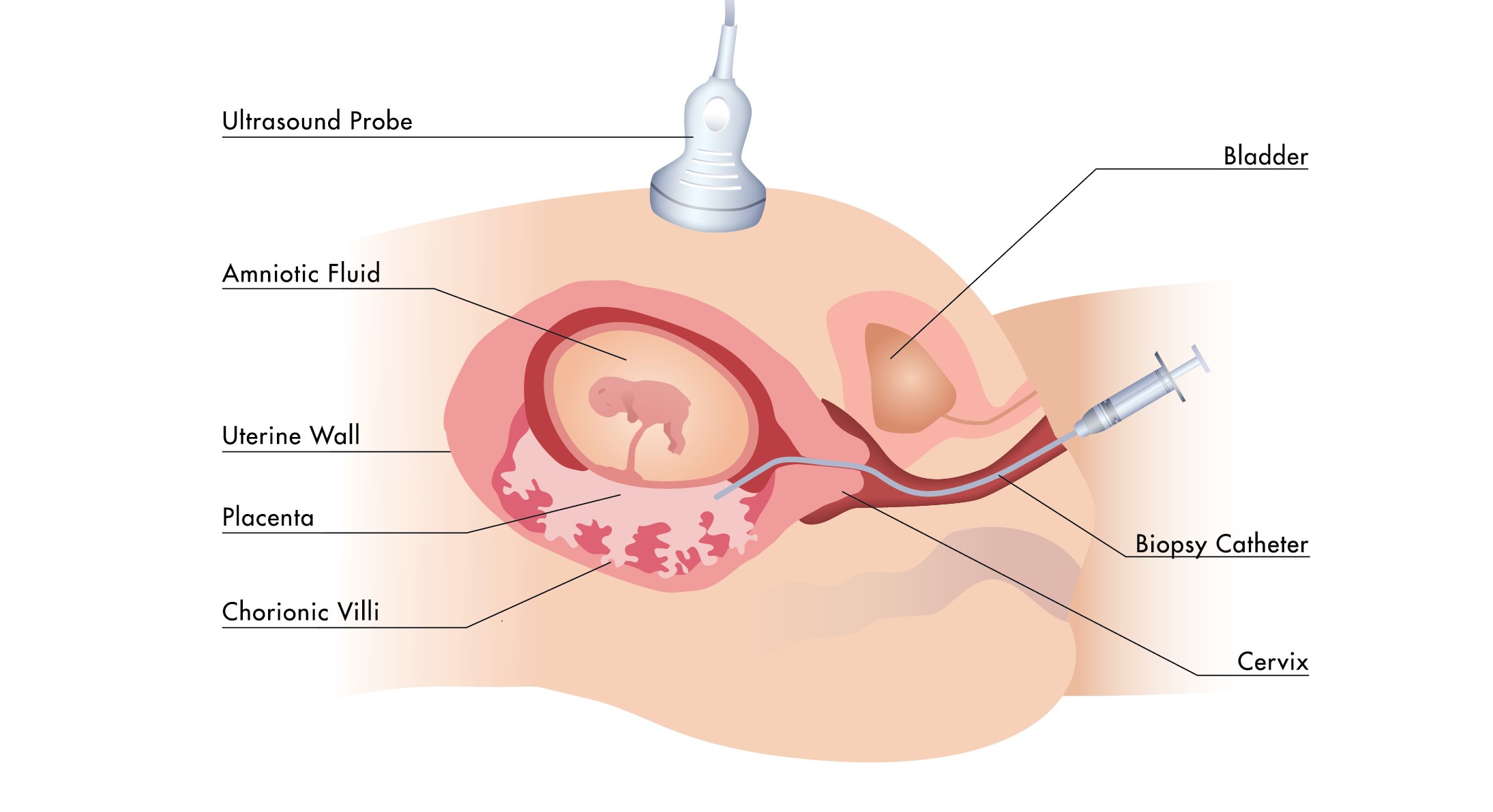A short video created by Alberta Health Services explains the microarray test and possible results. In this video, the testing was done through a blood draw. The way the test works and type of results are the same when the microarray is done through CVS.
Chorionic villus sampling
Chorionic villus sampling, or CVS, is a diagnostic test that can be done during the pregnancy. CVS is possible in the first trimester of pregnancy, between about 11 to 14 weeks. This testing can give you definitive answers about chromosome differences, and other genetic conditions.
Who can have CVS
These are some reasons for having CVS:
- You got a "screen positive" result from enhanced First Trimester Screening (eFTS).
- You got a "high risk" result from Non-Invasive Prenatal Testing (NIPT).
- NIPT failed to give you a result after two tries or more.
- Your 11-14 week (nuchal translucency) ultrasound detected a possible problem with the baby. For example, some people choose to have a CVS if there is a large nuchal translucency, or there is a heart defect seen on ultrasound.
- There is a genetic condition running in your family, and you wish to have the baby tested for it before birth.
How to get CVS
If you are interested in CVS, speak to your health-care practitioner about referring you to a specialist in genetics. There, you will get more information about this publicly-funded test, and the team will arrange the CVS if it is an appropriate test for you.

Transcervical CVS. Illustration adapted from Genetic Counseling Aids, 7th Edition, Copyright 2020, permission for use granted by Greenwood Genetic Center.
How it works
CVS is done at specialized centres in Ontario by trained doctors and nurses. An ultrasound is performed to first show them where the baby and of the placenta are. There are two ways that CVS can be done, depending on the position of the placenta and the expertise of the doctor:
-
"Transcervical" (most common way) - a special tool is passed through the vagina and the cervix to get to the placenta.
-
"Transabdominal" - a needle is inserted through the abdomen and uterus (womb) to get to the placenta.
Either way, a small piece of tissue is taken from the placenta and sent to the lab for testing. The tissue from the placenta usually has the same genetic information (DNA) as the baby.
The procedure generally takes a few minutes. Some people have brief discomfort such as a cramping sensation. You can rest that day, and you will likely be able to go back to your regular activities within one to two days.
What to expect after CVS
There is a risk of miscarriage (losing the pregnancy) from CVS which can make it difficult to decide whether to have this procedure. It is important to remember that there is always the chance of pregnancy loss even if CVS is not done. CVS increases this risk by less than 1%. CVS does not cause other problems for the baby (such as birth defects).
Results
The type of results that you get depends on which centre did the CVS and the reason for testing. It is important to speak with your genetics specialist about what results you will get. All results are sent directly to your genetics specialist.
Rapid testing (also called QF-PCR)
You will likely get some results 3 to 4 days after the CVS. These results can tell you if the baby has one of the following chromosome differences: trisomy 21, trisomy 18 or trisomy 13 or a sex chromosome difference.
Microarray testing
Depending on the hospital and the reason for testing, there might be a microarray test done from the same piece of tissue. Microarray testing can tell you whether there is material from other chromosomes that is extra or missing. These chromosome differences usually happen by chance in the sperm or the egg that made the baby. You get results from the microarray test in about 2 to 3 weeks.
Other genetic testing
Other genetic conditions can be tested in certain situations. Speak to your genetics specialist about whether there will be any other testing.
Benefits
There are several benefits to CVS:
CVS can give a “yes” or “no” answer about chromosome differences.
CVS is done earlier in pregnancy compared to the other diagnostic test (amniocentesis), so the results are also available earlier.
CVS can test for more genetic conditions compared to prenatal screening tests, (including NIPT).
You get information about trisomy 21, trisomy 18, and trisomy 13 faster than through prenatal screening tests.
Limitations
There are several limitations to CVS:
Like any test, CVS cannot look for every possible genetic condition. CVS will also not give you information about birth defects. Ultrasounds are still recommended to look at the growth and development of the baby.
There is a possibility to get results that are difficult to interpret
Rarely, we get results from amniocentesis that are difficult to interpret. This means that a genetic difference was found but we do not know what it means for the baby. Not every genetic difference has an impact on the baby's health and development.
Tests the genetic material (DNA) from the placenta, not the baby
The placenta and the baby usually have the same genetic information, but not always. This means that in some situations, amniocentesis is recommended instead of CVS. Amniocentesis tests the genetic material directly from the baby.
Contact Us
Prenatal Screening Ontario
CHEO Research Institute
Centre for Practice-Changing Research Building
401 Smyth Road
Ottawa, ON K1H 8L1
Information line
Phone: 613-737-2281
Toll-Free: 1-833-351-6490
Monday to Friday, 9:00 AM to 3:00 PM EST
Subscribe to PSO Updates
Subscribe to stay informed with the latest PSO news and prenatal screening updates in Ontario.
